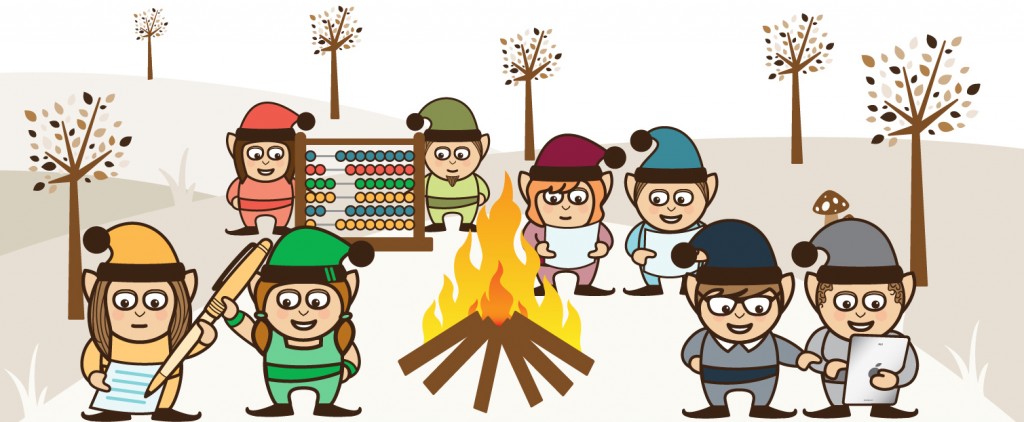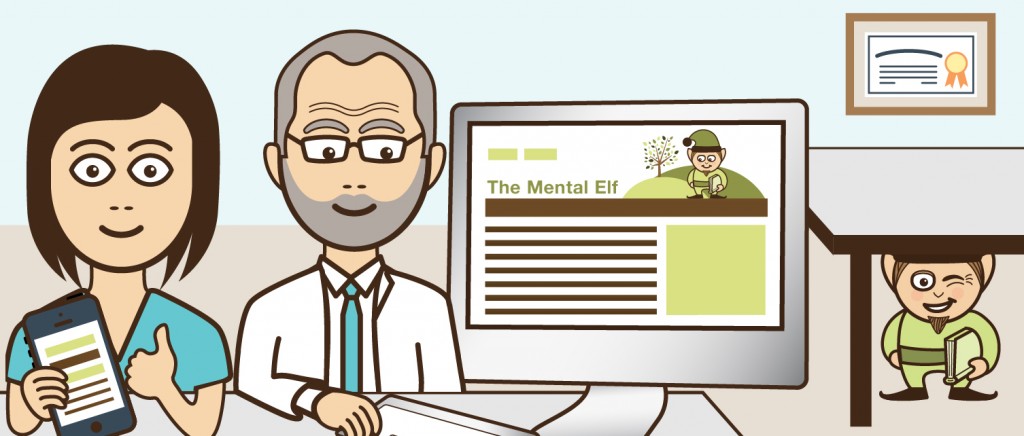
Digital mental health is thriving in 2013 and we are thrilled to be part of the growing community with our Mental Elf website and app.
We have had time to reflect on the development of the Mental Elf website recently, as André was interviewed by Hannah Nicklin from Hide and Seek who had been asked to put together some case studies of grassroot digital projects working in health and social care. This interview appears alongside six others in a new report published by the Institute for Public Policy Research earlier this week.
It’s striking how these positive stories of technological development have genuinely improved care and saved money. So what’s the secret?
The benefits of digital innovation in the public sector
The report, written by Sarah Bickerstaffe (Fellow in Health at IPPR) identified three key benefits of increasing the role of technology in public services:
- Saving time
- Boosting user participation
- Encouraging users to take responsibility for their own wellbeing
5 lessons for developers

Involving a diverse and representative sample of users in the development of digital products is essential
It also highlighted five lessons for those who implement technological innovations in public services:
- User-based iterative design is critical to delivering a product that solves real-world problems. It builds trust and ensures the technology works in the context in which it will be used
- Public sector expertise is essential in order for a project to make the connections necessary to initial development and early funding
- Access to seed and bridge funding is necessary to get projects off the ground and allow them to scale up
- Strong leadership from within the public sector is crucial to overcoming the resistance that practitioners and managers often show initially
- A strong business case that sets out the quality improvements and cost savings that the innovation can deliver is important to get attention and interest from public services
The Mental Elf story
Our own experience building the Mental Elf and the broader National Elf Service over the last 3 years has taught us a huge amount about the most effective way to design an evidence-based health website for professionals. We have involved a wide range of people in the process right from the start.

Being a member of the National Elf Service has loads of perks, not least the chance to get together around the campfire every evening to appraise the latest research
Over 200 people (service users, caregivers, researchers, academics, nurses, psychologists, psychiatrists, GPs, social workers, therapists, librarians, teachers – the list goes on and on!) have contributed directly to the project in that time, either as bloggers writing content for the site, or as test participants offering feedback on the design, content and functionality. We have been driven by the quantitative and qualitative data that we’ve gathered from these interactions and our iterative development style has allowed us to respond in a way that is unfortunately almost non-existent in big top-down NHS web projects.
This kind of user-based iterative design is often viewed as a luxury by the funders of digital projects, and as a result, it’s often the first thing to get cut if money is tight. Ironically, it’s probably the best ‘bang for the buck’ you get with digital development and if you don’t involve users in a meaningful way you run the very real risk of producing something unusable and irrelevant. We all know a fair few NHS web projects that fit that bill!
The power of collaboration
So what is it that brings these 200 people together and persuades them to donate their time? It’s really quite simple; we share many values and beliefs:
- A commitment to evidence-based healthcare: we want to get the best evidence into the hands of those who need it most
- A mutual trust: by reputation and behaviour
- A willingness to learn: there are no egos, and no such thing as bad feedback
- We are driven by results, not processes
- Ultimately, a share the belief that the National Elf Service will have a significant positive impact on patient care.
The benefits of grassroot development are easy to appreciate. Small teams working with few restrictions, following an agile creative path to an innovative product. It’s compelling stuff, but of course this relatively small scale development comes with it’s own challenges, especially when it comes to taking the product to market and finding a big enough client base to turn the innovative idea into a going concern. This is the central challenge for every digital mental health innovator and the barrier that prevents hundreds of great ideas actually succeeding on a national or international scale.
For us, collaboration is the answer, and that’s why the Mental Elf has joined the new CHaT Collaborative on Health and Technology, which was launched at the House of Commons on 21st November 2013. We know that NHS institutions want to invest in digital innovation, but it’s hard for them to do this when the market is so fragmented. CHaT is all about bringing together the very best digital innovation in mental health and presenting it as an interoperable and scalable system that institutions can buy for their staff.
2014 – The year of the Elf
Right now, the Mental Elf is a simple open access website (and a paid app) that highlights the latest reliable research for everyone. We will always continue to provide this free website service, but from next year we will also start to add new services for paid members. This is the best way for us to retain our independence from industry and provide a sustainable model for building your National Elf Service.
We have exciting plans for 2014 and you’ll hear more about them in a series of announcements that we’ll make throughout the first half of next year. For those of you who can’t wait until then, here’s a quick taster of the membership functionality we have planned:
- Professional development: we are building tools so that you can track your learning, create reflective practice notes and download certificates to your CPD or CME file
- Evidence-based journal clubs: we will be running interactive online journal clubs (video presentations and Skype-style meetings) so that members can appraise and discuss research together
- Expert community: public and private groups will facilitate members’ discussions
- Evidence alerts: advanced search tools will help members set up subject specific alerts, so you find out first when new research is published in your field
- Gamification: the whole membership service will make use of gaming techniques to incentivise learning and keep it innovative and fun. You will become an Elf Professional! ;-)
And of course, we’re already involving users in the development of this new website, so if you fancy a sneak peek at what we’re doing, please drop André an email and he’ll tell you more about how you can get involved!
Cheers,
André & Douglas
Founders of Minervation Ltd and the National Elf Service.

Health and social care professionals are going to love the new website features we’re building for 2014
Links
Bickerstaffe, S. Building tech-powered public services (PDF). Institute for Public Policy Research, Dec 2013.
CHaT (Collaborative on Health and Technology) website.
Co-producing Digital Mental Health (Victoria Betton’s blog).

HT via @Mental_Elf: Digital innovation works best when users involved at every stage http://t.co/Ko10E7khdK” ” the power of collaboration”
Read our blog about the new @IPPR report on Building Tech-Powered Public Services http://t.co/FGEl7bYue8 @sarahbic #DigitalMH13
@Mental_Elf Thanks for your input to the report! The collaborative on health and tech @CHaT_healthtech looks great
Morning @victoriabetton @CharlieY Hope you’re both well. Interested in your thoughts on my blog today: http://t.co/FGEl7bYue8 #DigitalMH13
@Mental_Elf @CharlieY it’s fab! Really interesting piece :-)
Digital innovation works best when users are involved at every stage http://t.co/RcsfOi5eAS via @sharethis Great blog
National Elf Service:@Mental_Elf:Read blog about new @IPPR report Building Tech-Powered Public Services http://t.co/X8FYNL5iHc #DigitalMH13”
You can find out more about our plans for 2014 and the future of the National Elf Service in this blog. Please have a read and let us know what you think!
Hi @hannahnicklin You’re mentioned in our blog today about digital innovation and mental health http://t.co/FGEl7bYue8
Brilliant! RT @Mental_Elf Hi @hannahnicklin You’re mentioned in our blog today about digital innovation&mental health http://t.co/wrbbMvx306
@CHaT_healthtech You’re mentioned in our blog today about digital innovation & mental health http://t.co/wLo4BC9U7U Tell us what you think!
@Mental_Elf brilliant blog! Thanks for sharing
Digital innovation in public sector saves time, boosts participation & helps ppl take responsibility for wellbeing http://t.co/wLo4BC9U7U
@Mental_Elf this is very powerful. Would like to find out more as to how you measure positive impacts for individuals
Grassroots digital innovation & the power of collaboration. It’s the story of @Mental_Elf Discussed today on our blog http://t.co/FGEl7bYue8
Don’t miss today’s http://t.co/4KbKXR70PR blog. André & Douglas discuss digital innovation, collaborative working & the National Elf Service
Check out the @IPPR’s top 5 tips for implementing technological innovations in public services http://t.co/FGEl7bYue8 #DigitalMH13
RT @Mental_Elf: 2014 is the Year of the Elf! Find out more about our plans for the National Elf Service http://t.co/FGEl7bYue8 #DigitalMH13
We are planning lots of exciting new features on the @Mental_Elf website next year. Find out more: http://t.co/FGEl7bYue8 #DigitalMH13
@Mental_Elf Will there be snow globes? Now that would be exciting!
2014 – the year of the Elf http://t.co/pLgtijIRFq @Mental_Elf
Excellent blog from @Mental_Elf on digital innovation and co design http://t.co/uqJdwN8gGq
Interesting blog by @Mental_Elf on how Mental Elf came to be what it is and what it means for digital health projects http://t.co/c8zT4IVoJQ
In case you missed it earlier: Digital innovation works best when users are involved at every stage http://t.co/FGEl7bYue8
“@Mental_Elf: Digital innovation works best when users are involved at every stage http://t.co/wp6QekNBjg”@mymindfeed we know that!
It’s a great piece. mind if i repost on http://t.co/hYEVtCWbb9… http://t.co/HOYGJhxEAs
Digital innovation works best when users are involved at every stage http://t.co/9wG4Kma8Z0 via @sharethis
Mental Elf: Digital innovation works best when users are involved at every stage http://t.co/1zLPrA4dJq
Digital innovation works best when users are involved at every stage http://t.co/lKfPxCxCnK < A blog from 2013 still relevant to #MindTech
Digital innovation works best when users are involved at every stage http://t.co/jGHVJaUoxF @SANEAustralia
[…] http://www.thementalelf.net/populations-and-settings/service-user-involvement/digital-innovation-wor… […]
[…] been coproducing our National Elf Service since day one and we’re always on the look out for new partnerships […]
[…] benefits of involving end users in every stage of digital innovation was previously set out in this Mental Elf blog which […]